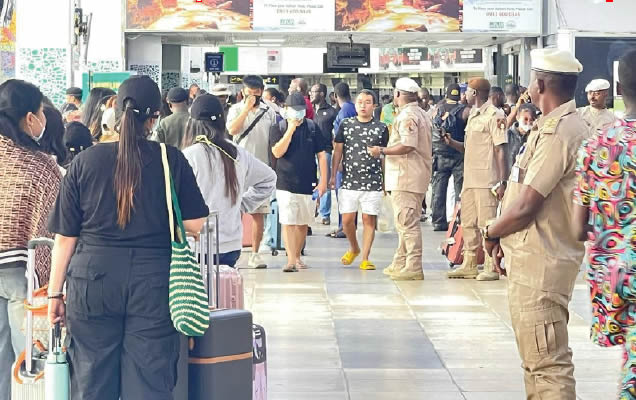Crime
Nigeria Deports 42 Convicted Chinese, Philippine Cybercriminals

By: Fabian Apechihin
The Nigerian Immigration Service (NIS) on Sunday commenced the deportation of 42 Chinese and Philippine nationals convicted of cybercrime and Ponzi scheme offences.
The deportees, the first batch of 192 convicts, were among 759 suspects arrested during a major raid on December 10, 2024, at Oyin Jolayemi Street, Victoria Island, Lagos. They departed Nigeria at 2:00 p.m. local time.
According to PUNCH Metro, all convicted foreigners were transferred to the NIS for repatriation, which is being carried out in phases. The remaining convicts are scheduled to be deported on Monday and Tuesday.
The syndicate had been running a large-scale cyber fraud and Ponzi operation before being dismantled in the joint raid.
A senior immigration official at the Murtala Muhammed International Airport, who confirmed the development on condition of anonymity, said the deportations were conducted discreetly for security reasons.
“Anyone convicted of a crime, whether or not they hold valid immigration status, faces deportation. In this case, these individuals were not removed for visa violations alone but for serious criminal offences. We cannot allow foreigners to commit crimes here and let Nigerians take the blame,” the officer said.
Another NIS official added that the service is monitoring other foreign nationals suspected of similar activities.
“This is part of our ongoing effort to secure Nigeria’s borders. We work quietly but effectively, and our priority is national security,” the officer noted.
The Economic and Financial Crimes Commission (EFCC), which prosecuted the cases, confirmed that the syndicate engaged in identity fraud, trained staff of Genting International Co. Limited in fraudulent practices, and violated provisions of the Advance Fee Fraud and Other Related Offences Act, 2006.
EFCC Chairman, Ola Olukoyede, described the deportations as a “significant milestone” in Nigeria’s anti-corruption fight.
“These convictions send a strong signal that Nigeria will not serve as a haven for cybercriminals. We remain committed to deepening investigations, recovering stolen funds, and restoring national integrity in line with President Bola Tinubu’s anti-corruption drive,” he said.
The December raid, one of Nigeria’s largest anti-cybercrime operations, is now being seen as a turning point in the country’s crackdown on transnational financial crimes.
Do you want me to make this version shorter and news-bulletin style (just the facts, no quotes) or long-form investigative style (with more emphasis on the backstory and implications)?
Crime
Banditry: Victims’ Families write President Tinubu Over Turji’s Confession, Demand Former Govs Yerima, Bafarawa’s Arrest.
Bothered over persistent insecurity across the country, a coalition of families torn apart by rampant banditry in Northwest Nigeria has appealed directly to President Bola Tinubu to investigate serious allegations against two former governors.
The Coalition of Families Affected by Banditry, representing victims who have lost loved ones, homes, and livelihoods to relentless violence, has written a letter to the President in Abuja.
Exhausted by domestic inaction, they called on the President to help uncover the truth behind claims that policies under former Zamfara Governor Ahmed Sani Yerima and former Sokoto Governor Attahiru Bafarawa laid the groundwork for the region’s insecurity through the seizure of grazing reserves and arming of vigilante groups.
In the letter signed by Chairperson Otuba Rawene, Secretary Sani Usman, PRO Haj. Hadijat Abdullahi, and 20 others, the group said: ” Many of us have lost loved ones in brutal killings, seen family members abducted, or been forced to flee our homes, leaving behind livelihoods and communities destroyed by violence.
“We write to Your Excellency with a profound sense of urgency and responsibility, seeking your support in addressing grave allegations recently made public by notorious bandit leader Bello Turji.
“In a widely circulated video released in December, 2025, Turji accused former Zamfara State Governor Ahmed Sani Yerima and former Sokoto State Governor Attahiru Bafarawa of laying the foundations for the current insecurity crisis.
“Specifically, he claimed that their policies— including the seizure and sale of grazing reserves and the arming of vigilante groups that targeted Fulani communities ignited ethnic tensions and cycles of reprisal violence that evolved into today’s widespread banditry.
“While we acknowledge that Bello Turji is a wanted criminal responsible for countless atrocities, including the deaths of many of our relatives, we believe these allegations warrant serious and impartial scrutiny.
“As the proverb goes, ‘where there is smoke, there is fire.’ Having exhausted domestic avenues for justice often met with inaction or allegations being dismissed we turn to the President, a steadfast champion of human rights and accountability, as our last hope for uncovering the truth and ensuring justice prevails.
“The scale of suffering caused by banditry in Northwest Nigeria is staggering and demands international attention.
Reliable reports indicate thousands of civilian deaths, mass displacements, and profound economic devastation. For instance, between 2018 and 2020 alone, armed banditry caused at least 4,900 deaths.
“In the first half of 2025, over 2,266 people were killed by insurgents and bandits, surpassing the total for all of 2024. Recent data document thousands abducted annually, with verified ransom payments reaching billions of naira (e.g., N2.57 billion between July 2024 and June 2025).
“These attacks have displaced hundreds of thousands, disrupted agriculture and trade, deepened poverty, and inflicted lasting trauma on survivors. Communities live in constant fear, with bandits imposing illegal levies and operating with impunity.
“As victims seeking justice and an end to this cycle of violence, we implore the Nigerian government to publicly to launch a prompt, independent, and thorough investigation into Bello Turji’s allegations against the named former governors. Offer technical assistance or support international oversight to ensure the probe is credible and free from political interference.
“Advocate for broader measures to address impunity, including sanctions if evidence of complicity in serious crimes emerges. We firmly believe that accountability for those who may have contributed to this crisis regardless of their status is essential to breaking the cycle of violence and restoring peace.”
Business
Nestoil: Lagos CP dragged to court for contempt, risks imprisonment

This is certainly not a good time for the Lagos State Police Commissioner, Mr. Moshood Jimoh as he has been dragged to court for commiting contempt by defying a clear court order that he and his men must not go near the business premises of Nestoil Group which belongs to Drawcok Estates LTD.
The fresh suit by Drawcok Estates LTD followed Monday’s deployment of over fifty armed police officers by Mr. Moshood Jimoh to seal off the business premises of Nestoil Group which belongs to Drawcok Estates LTD despite an order by Justice Ofili Ajumogobia.
Also, despite a directive by the federal government that police escorts be withdrawn from VIPs, Mr. Moshood Jimoh illegally allocated several police officers to be guarding Mr. Sulu Gambari, the self-acclaimed Receiver Manager which was appointed by a former judge that was handling the case, Justice Isaac Dipeolu.
Recall that Justice Daniel Osiagor of the Federal High Court in Ikoyi vacated all the orders made by Justice Isaac Deinde Dipeolu who wrongly appointed the Receiver Manager.
Meanwhile, dissatisfied with the action of the Lagos Police Commissioner, Drawcok Estates LTD yesterday filed a case of contempt against the Lagos State Commissioner of Police, Mr. Olohundare Jimoh Moshood (Contemnor) before a Federal High Court in Abuja.
In Suit No: FHC/ABJ/CS/2385/2025, the applicant wants Police Commissioner Moshood Jimoh to be found guilty of contempt of court and also be committed to prison unless he obeys the directives contained in Justice Ofili Ajumogobia’s Order of November 24, 2025.
Recall that Justice Ofili Ajumogobia had on November 24, 2025 ordered that the building in question belongs to Drawcok Estates LTD, adding that no police officer must be seen carrying out orders of the Lagos State Police Commissioner around the premises.
The Orders made by Justice Ofili Ajumogobia on November 24, 2025 in suit number FHC/ABJ/CS/2385/2025 were that:
The applicant has a right to own and possess her properties as mentioned in the addresses above as guaranteed by the 34 Constitution of the Federal Republic of Nigeria, 1999 as amended and the African Charter on Human and People’s Rights..
That the sealing-off and occupation of the applicant’s properties on the addresses mentioned above by the Respondents constitute an infringement on the right of the applicant to own property, as guaranteed by Sections 43 and 44 of the he Constitution of the Federal Republic of Nigeria, 1999 as amended.
That the Respondents, whether by themselves , their agents, agencies and servants, acting for it through them or any other person(s) howsoever described or claiming through them, to vacate the applicant’s properties on the addresses mentioned above, and deliver possession over to the applicant forthwith.
That the Respondents, whether by themselves, their agents, agencies, and servants, acting for or through them or any other person(s) howsoever described or claiming through them, to provide security for the applicant to take back possession of her properties on the addresses mentioned above.
That the Respondents is restrain, whether by themselves, their agents, agencies and servants, acting for or through them or any other person(s) howsoever described or claiming through them, from harassing the applicant and refusing her access to her properties on the addresses mentioned above.
Nigerian Concord Newspapers reporters that visited the business premises yesterday reported that pollice officers have been denying workers of several companies access to their offices located within the Nestoil building in Lagos on the order of Moshood Jimoh, despite a subsisting court order directing that they be allowed into the premises.
The affected workers had resumed duties following a court order delivered by Hon. Justice Ofili Ajumogobia of the Federal High Court, Abuja on November 24, which directed that they be granted access to their offices.
Crime
Police Confirm Abduction of 25 Female Students in Kebbi School Attack

By: Fabian Apechihin
The Kebbi State Police Command has confirmed that 25 female students were abducted and one person killed during an attack on Government Girls’ Comprehensive Secondary School, Maga, in Danko/Wasagu Local Government Area.
Police spokesperson CSP Nafi’u Abubakar said the attack occurred around 4 a.m. on Monday when heavily armed bandits stormed the school, firing sporadically.
According to Abubakar, police tactical teams were deployed immediately after a distress call and engaged the attackers in a gun duel. By the time security operatives arrived, the bandits had already scaled the school fence and abducted 25 students from their hostel.
He confirmed that one person, identified as Hassan Makuku, was shot dead, while another victim, Ali Shehu, sustained a gunshot wound to his right hand.
Abubakar added that additional police units, soldiers, and vigilante groups have been deployed to track the bandits and rescue the abducted students. Security teams are currently combing nearby forests and possible escape routes.
He urged residents to remain calm, stay alert, and cooperate with security agencies as operations continue.
-

 Uncategorized5 years ago
Uncategorized5 years agoFG, states urged to harness flooding for ranching, others with technology – Agbaje
-

 Headlines10 years ago
Headlines10 years agoBreaking: EFCC seals Borno House of Assembly, as Hon members take to their heels
-

 News12 years ago
News12 years agoNigeria Security Operatives Stage Manhunt For Homosexual Perpetrator
-

 News9 years ago
News9 years agoHow 21-year-old Girl fled community over accusation of lesbianism
-

 News10 years ago
News10 years agoYobe Gov Moves Against Deputy
-

 Opinion7 years ago
Opinion7 years ago7 signs she has friend zoned you
-
Technology4 years ago
Online job placement company headhunts women
-

 Headlines10 years ago
Headlines10 years agoBorno Dep Gov Abducts Another Church Leader





